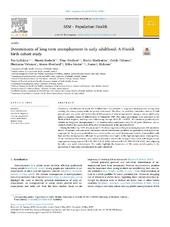| dc.contributor.author | Lallukka, Tea | |
| dc.contributor.author | Kerkelä, Martta | |
| dc.contributor.author | Ristikari, Tiina | |
| dc.contributor.author | Merikukka, Marko | |
| dc.contributor.author | Hiilamo, Heikki | |
| dc.contributor.author | Virtanen, Marianna | |
| dc.contributor.author | Øverland, Simon Nygaard | |
| dc.contributor.author | Gissler, Mika | |
| dc.contributor.author | Halonen, Jaana I | |
| dc.date.accessioned | 2019-08-14T12:49:57Z | |
| dc.date.available | 2019-08-14T12:49:57Z | |
| dc.date.issued | 2019-08 | |
| dc.Published | Lallukka T, Kerkelä, Ristikari T, Merikukka, Hiilamo H, Virtanen M, Øverland SØ, Gissler M, Halonen JI. Determinants of long-term unemployment in early adulthood: A Finnish birth cohort study. SSM - Population Health. 2019;8:100410 | eng |
| dc.identifier.issn | 2352-8273 | |
| dc.identifier.uri | https://hdl.handle.net/1956/20668 | |
| dc.description.abstract | Cumulative contributions of social and health-related determinants to long-term unemployment during early working life among young adults are poorly understood. Therefore, we used four cumulative indices of both parental and own social and health-related determinants of such unemployment among a cohort which comprised a complete census of children born in Finland in 1987. The cohort participants were registered in the Medical Birth Register, and they were followed-up through 2015 (N = 46 521). We calculated predicted probabilities for long-term unemployment (> 12 months) when participants were 25–28 years. Moreover, we examined whether the associations differed by unemployment at the municipal level. During the follow-up, 4.5% of women and 7.1% of men experienced long-term unemployment. All cumulative indices of parental and own social and health-related determinants predicted the probability of long-term unemployment. The greatest probabilities were observed for own social determinants, both in municipalities with high and low unemployment although the probabilities were higher in the high-unemployment municipalities. Of the individual determinants, poor school performance showed the strongest association with long-term unemployment among women (OR 6.65, 95% CI 5.21–8.55) and men (OR 3.70, 95% CI 2.96–4.67), after adjusting for other own social determinants. The results highlight the importance of life course social equality in the prevention of long-term unemployment in early adulthood. | en_US |
| dc.language.iso | eng | eng |
| dc.publisher | Elsevier | eng |
| dc.rights | Attribution CC BY-NC-ND | eng |
| dc.rights.uri | http://creativecommons.org/licenses/by-nc-nd/4.0/ | eng |
| dc.subject | Social determinants | eng |
| dc.subject | Psychiatric diagnoses | eng |
| dc.subject | Teen-age pregnancies | eng |
| dc.subject | School performance | eng |
| dc.subject | Register-based | eng |
| dc.subject | Child protection action | eng |
| dc.title | Determinants of long-term unemployment in early adulthood: A Finnish birth cohort study | eng |
| dc.type | Peer reviewed | |
| dc.type | Journal article | |
| dc.date.updated | 2019-06-20T10:55:00Z | |
| dc.description.version | publishedVersion | |
| dc.rights.holder | Copyright 2019 The Author(s) | eng |
| dc.identifier.doi | https://doi.org/10.1016/j.ssmph.2019.100410 | |
| dc.identifier.cristin | 1706441 | |
| dc.source.journal | SSM - Population Health | |

